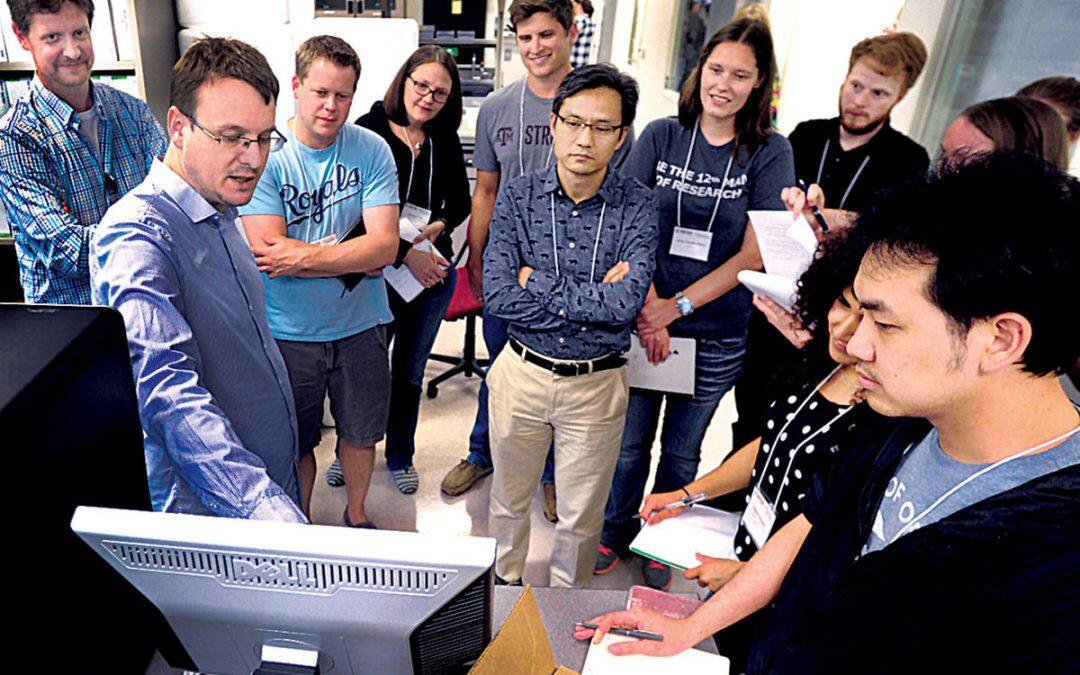For years, genome sequencing has been a practice that’s largely isolated to large research groups with the resources to bear the lofty cost of the necessary equipment. Today, however, rapid advances in the technology behind the science is quickly finding its way out of the laboratory and into the lives of everyday people.
The Texas A&M AgriLife Research Genomics and Bioinformatics Service is hosting a training this week where 38 Texas A&M students and other researchers from around North America are getting hands-on experience with the Oxford Nanopore Technology MinION — a genome sequencing system not much larger than a USB flashdrive, which officials said is rapidly expanding accessibility and possibilities of the field.
Charles Johnson, director of genomics and bioinformatics and executive director of the Center for Bioinformatics and Genomic Systems Engineering at the service, said the five-day training workshop — part of the PoreCamp series that began in 2015 — features five scientists considered leading experts in the field. The workshop is notable as the first of its kind in the U.S.
Johnson said the workshop is specifically designed to replicate previous courses that the scientists have conducted in the United Kingdom by giving participants the chance to learn more about several facets of the technology, its uses and the process behind it through a combination of lectures, lab demonstrations and hands-on testing.
Johnson also noted Texas A&M has some ties to the history behind the MinION in the form of Oxford Nanopore Technology founder and professor of chemical biology at the University of Oxford Hagan Bayley. Between 1997 and 2003, Bayley was a faculty member at A&M, leaving just two years before he founded the nanopore science company.
Where previous iterations of the technology required large, washing machine-sized equipment connected to supercomputers, Johnson said the pocket-sized MinION has opened up a world of new opportunities to researchers by offering quality performance in a miniature package.
John Tyson, research associate at the University of British Columbia and one of the scientists leading the workshop, said one of the most exciting things about both the training and the technology itself is how it is helping to “democratize the sequencing field.”
“They’re trying to let everybody have a go, even if they’re not producing anything that’s really fantastic,” Tyson said.
At a starting price of $1,000, Tyson said the MinION puts the technology and testing capabilities within reach of researchers — and even private citizens — who may have previously been excluded by the high cost. In the coming years, Tyson said he expects to see the cost for the technology continue to decline as it is further refined and developed for a spectrum of specific purposes, such as diagnostic tests conducted in clinic.
Among the most exciting — and occasionally frustrating — aspects of the technology, Tyson said, is the rate of rapid evolution it is currently undergoing. He said often significant changes in coding or method can occur from week to week.
“You’ve got to have a certain amount of willingness to try it and willingness for it to go wrong,” Tyson said.
Two of the other featured scientists leading the workshop — Nick Loman of Birmingham University and Mick Watson of the University of Edinburgh — said the MinION technology has made it into the field, with members of their team using it to test and detect for the Ebola virus in Guinea and the Zika virus in Brazil.
Loman said the portable size and ability to connect the MinION to a computer via a USB cable have opened up a broad range of new possibilities to researchers, including the ability to travel closer to the source of the subject they are studying and analyzing the data in real-time on site.
“At the moment, we kind of react to these outbreaks and we want to get out of this reactive mode,” Loman said. “We want to be able to spot problems when they’re small and addressable rather than when they get out of control, which is what happened with Zika.”
Source: http://bit.ly/2r4nrih











